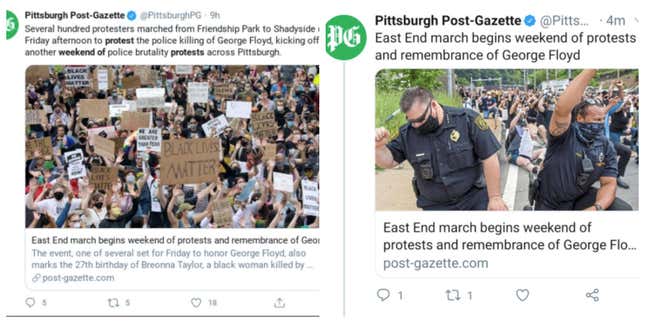
Staffers with the Pittsburgh Post-Gazette have been publicizing the disastrous, racist decision-making of top management, who last week sidelined two black journalists from reporting on the Black Lives Matter protests that have cropped up around the country. Their coverage ban reportedly expanded as dozens of staffers called out the paper and stood in solidarity with their black colleagues.
But protest coverage is still ongoing at the paper, and management’s decisions around recent police brutality posts have further escalated the crisis at the Post-Gazette.
As the Pittsburgh City Paper reports, two stories published by the Post-Gazette were removed from its website on June 5, after they were already shared on its social media platform. One reported wrote about a local protest in honor of George Floyd, the 46-year-old black man killed by police in Minneapolis late last month. The other story centered on a discussion on police brutality and possible reforms discussed by city councilors.
Reporter Ashley Murray, who wrote the latter story, tweeted that she alerted management to the issue that night and received no response as to why her story was unavailable.
Early Friday morning, new links to the stories emerged with the original headlines, but staff bylines were cut from the articles. The story Murray wrote was rewritten, and the lead photo changed. The original image showed a protester facing down a line of police in riot gear as a tear gas canister belched noxious gas onto the street. It was replaced with a more placid image of National Guard soldiers standing in front of a truck.
The same was true of reporter Lauren Lee’s coverage of the Pittsburgh Black Lives Matter protests. Gone was her byline and lead photo, which originally showed a wide shot of a diverse crowd holding up signs calling for police accountability and stating support for black lives. It was replaced with an image of white cops kneeling in “support” of the protests.
Photos of the protest taken by staff photographer Andrew Rush were also stripped from the story.
The takedown of the posts happened after staffers openly revolted against company management after the sidelining of Alexis Johnson, who is black, from protest coverage after she tweeted a joke pointing out the hypocrisy of those expressing outrage at “looting” at the protests.
Management has yet to provide any answers on why they changed the stories, though the changes, frankly, speak for themselves. At a time when the nation and its institutions are being called to consider massive structural changes in order to address deep-seated racial inequities, the Post-Gazette has opted to practice censorship instead.
The move is outrageous, of course; so outrageous that the Giant Eagle supermarket chain pledged this week to stop selling the Post-Gazette at its stores (on top of donating another $350,000 to support social justice causes).
The thing is—the thing anyone in charge of any institution ought to realize by now—even when you’re operating behind closed doors, we can still see you.

